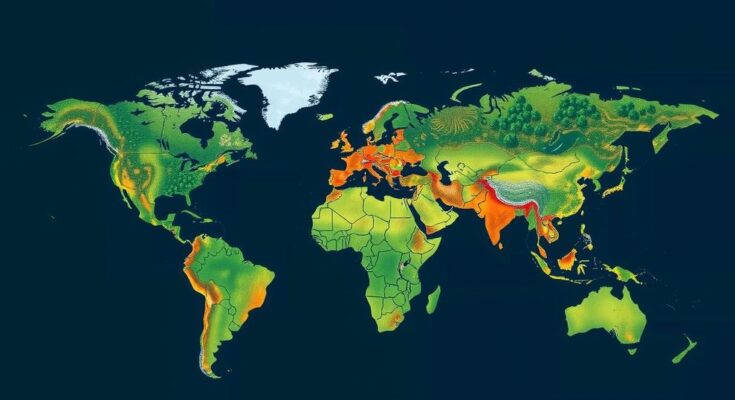Wealthier nations are beginning to compensate poorer countries for climate change damages, as seen in Malawi where a resident received a payment of $750 following Cyclone Freddy’s devastation. A $720 million fund was pledged by various nations to assist developing countries, but experts warn it will be insufficient as climate disasters escalate. Ongoing negotiations at COP29 aim to establish guidelines for this funding, highlighting the moral obligation of industrialized nations to support those disproportionately affected by climate impacts.
In recent developments, wealthier nations have started compensating poorer countries for damages incurred as a result of climate change. An illustrative case is Christopher Bingala from Malawi, whose life was severely disrupted by Cyclone Freddy, which triggered floods leading to substantial losses for him and thousands of others. Following the disaster, Bingala received a payment of approximately $750, marked as one of the initial instances of ‘loss and damage’ funding. This new financial approach aims to support low-income nations, which disproportionately suffer from extreme climate events despite contributing minimally to global emissions. Approximately $720 million has been pledged by various countries, including the European Union and the United States, but experts caution that this sum will likely be inadequate in addressing the escalating climate crisis.
At the COP29 climate summit in Baku, Azerbaijan, ongoing discussions aim to establish definitive guidelines regarding the compensation owed to developing nations as part of a broader climate finance initiative. Political figures, including Philip Davis, Prime Minister of the Bahamas, emphasize the moral obligation of industrialized nations to acknowledge their contribution to climate-related repercussions. Cyclone Freddy, for instance, displaced around 650,000 individuals in Malawi alone, highlighting the urgent need for an effective funding mechanism.
Bingala’s situation underscores the precariousness of agricultural livelihoods in the wake of such disasters, as he struggled to feed his family in temporary camps. The cash assistance not only enabled him to reconstruct his home but also uplifted his family’s circumstances, moving them to a less vulnerable area. The funds were dispensed through a governmental initiative by Scotland, a pioneer in dedicating resources for loss and damage, executed via the non-profit organization GiveDirectly, which provides direct cash transfers to those affected.
This funding initiative serves as a pilot for a more extensive system aimed at compensating nations largely unconnected to climate emissions yet severely impacted by climate change effects. As nations finalize the operational framework of the fund at COP29, there is increasing recognition of the necessity for investments beyond immediate disaster recovery; proposals include funding for relocation and preservation of ecological heritage sites. Experts predict that the demand for loss and damage funding will escalate, with estimates suggesting it may reach $250 billion annually by 2030. The consequences of inaction extend beyond borders, affecting even the most advanced nations if developing countries succumb to climate-induced crises. Davis articulates a pressing concern: “If they do nothing, they will be the worst for it. When my islands are swallowed up by the sea, then what do my people do?”
The escalating climate crisis has resulted in severe weather patterns affecting vulnerable nations, which have contributed minimally to the global emissions that fuel climate change. Recent natural disasters, highlighted by Cyclone Freddy, have prompted discussions about the moral and economic responsibilities of wealthier nations towards their less affluent counterparts. The establishment of dedicated funding for loss and damage is aimed at addressing the immediate financial burdens faced by developing countries as a consequence of climate-induced calamitous situations. This context underscores the inherent inequity in global climate action and the pressing need for systemic support mechanisms.
In conclusion, the emergence of loss and damage funding represents a critical step towards addressing the climate-induced challenges faced by low-income nations, such as Malawi. As pledges from wealthier countries accumulate, there remains an urgent need to refine the operational structures of such funds to ensure they are adequately dispensed to those in need. The situation of individuals like Christopher Bingala highlights the human toll of climate change, underscoring the necessity for a concerted global response to mitigate and address these emerging vulnerabilities effectively.
Original Source: www.wuwm.com




